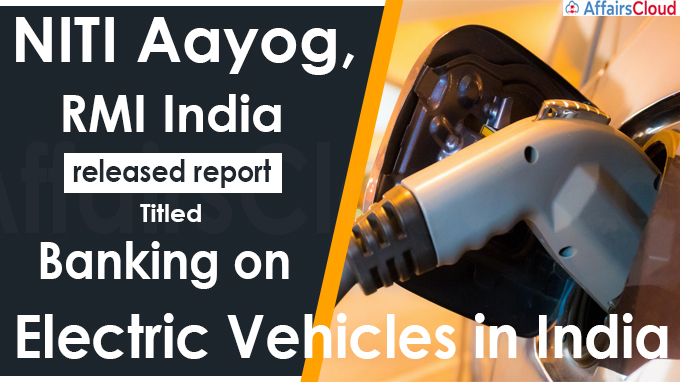
NITI (National Institution for Transforming India) Aayog in collaboration with Rocky Mountain Institute (RMI), and RMI India released a report titled ‘Banking on Electric Vehicles in India- A Blueprint for Inclusion of EVs in Priority Sector Lending Guidelines’.
- It has proposed the government to include Electric Vehicle (EVs) in the Reserve Bank of India’s (RBI) priority-sector lending (PSL) guidelines to boost retail lending for EVs and to support the decarbonization of road transport.
- As per it, banks and non-banking financial companies (NBFCs) have a potential to achieve an EV financing market size of Rs 40,000 crore (USD 5 billion) by 2025 and Rs 3.7 lakh crore (USD 50 billion) by 2030.
- Cumulative investment in India’s electric vehicle (EV) transition could be as large as INR 19.7 lakh crore ($US266 billion) between 2020 and 2030.
Key Recommendations:
i.It also recommended RBI to consider various EV segments and use cases based on five parameters: socio-economic potential, livelihood generation potential, scalability, techno-economic viability, and stakeholder acceptability.
- Electric two-wheelers, three-wheelers, and commercial four-wheelers can be put under PSL on priority.
ii.EVs can be recognized as an infrastructure sub-sector by the Ministry of Finance.
iii.Incorporation of EVs as a separate reporting category under the RBI.
Click here for Official Report
How will RBIs PSL mandate be helpful?
Currently, buyers are unable to access low-interest rates and long loan tenures for EVs as banks are concerned about resale value and product quality. But RBI’s PSL mandate improves the supply of formal credit towards areas of national priority which will be an accurate solution to this.
- PSL aims to expand financial access and support employment opportunities in India.
Points to be noted:
i.The recommendations by the report will aid in India’s 2070 net-zero targets. India is also committed to the EV30@30 initiative to reach a 30% sales share for EVs by 2030.
ii.In India, NITI Aayog and the World Bank (WB) are setting up a $US300 million first-loss risk-sharing instrument.
- It will act as a guaranteeing mechanism that banks and NBFCs can access in the event of payment delays on EV loans. The programme is expected to bring down the financing costs for EVs by 10-12%.
Recent Related News:
i.On 15th September 2021, NITI Aayog in partnership with RMI, and RMI India launched a campaign named “Shoonya” – an initiative to promote the usage of Zero-pollution delivery vehicles among e- commerce companies, fleet aggregators, original equipment manufacturers (OEMs) and logistics companies.
About NITI (National Institution for Transforming India) Aayog:
Establishment–2015
CEO– Amitabh Kant
Headquarters– New Delhi, Delhi
About Rocky Mountain Institute (RMI):
Establishment – 1982
Headquarters – Basalt, Colorado, US